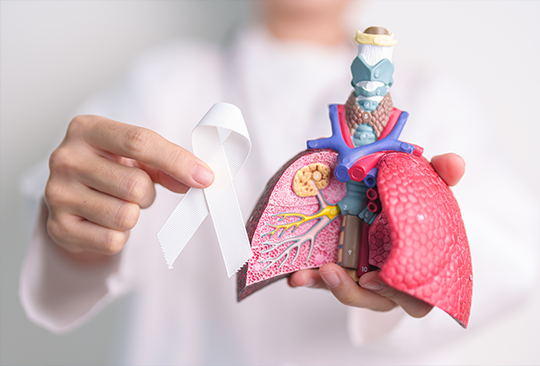Lung cancer causes more death than any other cancer in the U.S. Symptoms of lung cancer vary from person to person. Some have coughing, wheezing and chest pain. But most people don’t have signs until the cancer is advanced.
Smoking causes most lung cancers — both in smokers and in people exposed to secondhand smoke regularly.
Risk Factors
- Risk Factors for lung cancer include:
Smoking: Your risk grows with the number of cigarettes you smoke each day and the number of years you’ve smoked. Quitting at any age can cut your risk of getting lung cancer.
Exposure to secondhand smoke: Your risk increases if you're exposed to secondhand smoke. Avoid areas where people smoke.
Radiation therapy: If you've had radiation to the chest for some other type of cancer, you may have a higher chance of developing lung cancer.
Exposure to radon gas: Radon is made by the normal breakdown of uranium, and breathing it can be harmful. Unsafe levels can be found in homes and other buildings. You can test your home for radon.
- Exposure to asbestos: Workplace exposure to asbestos can raise your risk of lung cancer. So can being around other substances known to cause cancer, like arsenic, chromium and nickel. The risk is even higher if you’re also a smoker.
- Family history: People with a parent, sibling or child with lung cancer have an increased risk for the disease.
Lung Cancer Screening

Lung cancer screening can help catch cancer earlier, when it may be more treatable. But it isn’t recommended for everyone.
Lung cancer screening can have risks. It’s recommended only for adults who are at high risk for developing the disease because of their smoking history and age.
If you smoke now or have smoked in the past and are over 50, talk to your doctor about lung cancer screening.
Prevention
Many choices for better overall health are also good for your lungs. Follow these tips to protect your lungs.
- Get routine health exams and preventive care. Even if you aren’t sick, a routine yearly health exam can help prevent serious health problems. During your health exam, your doctor will listen to your lungs while breathing. And you can talk about your concerns.
- Exercise. Staying active is good for your total health. Exercise also helps improve lung capacity. Breathing exercises can also boost your mood and help you relax.
- Avoid exposure to pollutants. They can cause lung disease or make it worse.
- Prevent infection. Protect yourself from respiratory and other infections:
- Wash your hands with soap and water. Use alcohol-based cleaners if you aren’t near a sink.
- Take care of your teeth and gums. Brush your teeth at least twice daily. And see your dentist at least every six months to guard against infections.
- Get your flu vaccine. And talk to your doctor to find out if the COVID-19 and pneumonia vaccines are right for you.
- If you get sick, stay home. Help protect the people around you by keeping your distance when you’re sick.
Talk to your doctor if you have concerns about your lung health.
Resources for TRS-Care Standard and TRS-Active Care
Provider Finder®
If you need to find a doctor, you can search by location, specialty and more through Provider Finder®.
You can also connect with a plan specialist about coverage and benefits or to get help finding a provider. They can even make an appointment for you! Call 1-866-355-5999 or chat in the BCBSTX App, 24 hours a day, seven days a week.
Resources for TRS-Care Medicare Advantage
Get the Care You Need
For more information about plan coverage or to find a primary care physician call UnitedHealthcare toll-free 1-866-347-9507, TTY 711, 7 a.m.-6 p.m. CT, Monday-Friday or sign in or register on your member website at retiree.uhc.com/TRS-CareMA.